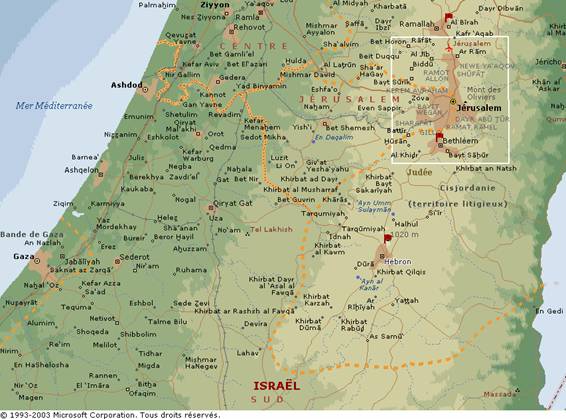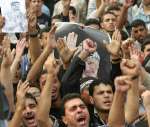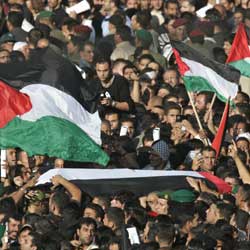

http://www.reuters.fr/locales/c_newsArticle.jsp?type=topNews&localeKey=fr_FR&storyID=6785635
Reuters
à la Une
Des
violences éclatent dans les territoires palestiniens

Thu
November 11, 2004 1:32 PM CET
GAZA (Reuters)
- Des activistes palestiniens ont attaqué jeudi une colonie juive de la bande
de Gaza en présentant cette action comme le signal de départ d'un nouveau
cycle de violences contre Israël après la mort de Yasser Arafat.
Des soldats
israéliens ont tué deux de ces activistes qui ont attaqué le bloc de colonies
de Netzarim, dans le centre de la bande de Gaza, peu après l'annonce dans ce
territoire de la mort du leader palestinien, ont annoncé des médecins.
Ces activistes
ont ouvert le feu et fait exploser une bombe contre la colonie. Ils ont en outre
tenté de tirer une roquette RPG contre cette implantation. Une porte-parole de
l'armée israélienne a précisé que cinq des activistes avaient été touchés
dans la fusillade qui a suivi l'attaque.
Abou Koussaï,
porte-parole des Brigades des martyrs d'al Aksa, groupe armé lié au Fatah
d'Arafat, a dit tenir Israël pour responsable de la mort du président
palestinien.
"Notre
mouvement et les frères des autres factions ont pris les armes pour faire payer
le prix à l'ennemi. Nous assisterons partout dans les prochains jours à de
violents affrontements avec les sionistes", a-t-il dit.
Les forces de sécurité
israéliennes sont en état d'alerte renforcé car Israël redoute une
recrudescence des violences au Proche-Orient.
Des dizaines de
jeunes Palestiniens ont jeté des pierres sur un poste de contrôle près de
Ramallah, ville de Cisjordanie où Arafat sera enterré vendredi.
D'autres
affrontements avec jets de pierres ont été signalés dans plusieurs localités
de Cisjordanie.
Yasser Arafat
est décédé dans la nuit de mercredi à jeudi à l'hôpital militaire Percy,
près de Paris.
Koussaï a attribué la responsabilité du décès d'Arafat aux
autorités israéliennes qui, selon lui, l'ont obligé à vivre pendant deux ans
et demi dans des conditions très précaires dans son QG de Ramallah, étroitement
surveillé par l'armée israélienne.
http://radio-canada.ca/nouvelles/International/nouvelles/200411/11/003-po-jeudi-violences.shtml
Radio Canada.ca
Proche-Orient: la violence continue
|
|
Mise
à jour le jeudi 11 novembre 2004 à 12 h 33
|
. |
Des
affrontements entre Israéliens et Palestiniens ont entouré l'annonce de la
mort du président Yasser Arafat.
Placée en état
d'alerte, l'armée israélienne a imposé un bouclage de la bande de Gaza et de
La
guerre des pierres
|
. |
À
l'annonce de la mort de leur président, les Palestiniens sont allés exprimer
leur douleur dans la rue. Dans plusieurs villes de Cisjordanie, la population a
réagi à l'annonce du décès de Yasser Arafat en lançant des pierres sur des
cibles israéliennes. Des dizaines de jeunes s'en sont par exemple pris à un
poste de contrôle israélien près de Ramallah, ville de Cisjordanie où le président
palestinien devrait être enterré vendredi.
Un Palestinien
de 22 ans, Jamil Abou Maria, a été tué par des tirs israéliens au nord
de Hébron, dans le sud de
Une
attaque revendiquée
À Gaza, des
membres des Brigades des martyrs d'Al-Aqsa ont attaqué une colonie juive de la
bande de Gaza. Ils ont ouvert le feu et fait exploser une bombe dans la colonie.
Deux d'entre eux ont été tués par l'armée israélienne, qui affirme avoir
blessé d'autres membres du commando.
Abou Koussaï,
porte-parole du groupe armé relié au Fatah, a annoncé que cela n'était que
le début de la vengeance des Brigades: « notre mouvement et les frères
des autres factions ont pris les armes pour faire payer le prix à l'ennemi.
Nous assisterons partout dans les prochains jours à de violents affrontements
avec les sionistes ». Il attribue la responsabilité du décès du président
palestinien aux autorités israéliennes, qui l'ont cantonné dans son quartier
général à Ramallah pendant deux ans et demi, dans des conditions sanitaires
très précaires.
http://lcn.canoe.com/lcn/infos/lemonde/archives/2004/11/20041111-202953.html
Mise
à jour: 11/11/2004 20h33
Décès de Yasser Arafat
![]()
Affrontements
entre des Palestiniens et l'armée israélienne
Il y a eu des incidents entre des Palestiniens et l'armée israélienne
à Ramallah et Bethléem. Plusieurs centaines de Palestiniens ont lancé des
pierres sur des voitures israéliennes et brûlé des pneus.
Les soldats
israéliens ont tiré des balles en plastique et des gaz lacrymogènes pour
disperser 400 personnes dans un village près de Hébron.
Deux
gardes-frontière de l'État hébreu et un Palestinien ont été légèrement
blessés.
Des pierres ont
également été lancées sur des voitures israéliennes sur une route entre Jérusalem
et
Des milliers de
Palestiniens ont manifesté devant
Les
manifestants, dont plusieurs sympatisants du Fatah, du Hamas et des Brigades des
Martyrs d'al-Aqsa ont défilé en scandant le nom d'Arafat.
Plusieurs
personnes se sont recueillies devant les murs de
Au même
moment, sur l'esplanade de
Une dizaine
d'ouvriers continuent à préparer la fosse ou sera porté en terre le chef
palestinien.
Réactions
du peuple arabe
Dans plusieurs
pays arabes, le décès de Yasser Arafat a provoque des manifestations d'appuis
au peuple palestinien.
Des marches ont
eu lieu dans plusieurs endroits du Liban ou des milliers de réfugiés
palestiniens vivent toujours dans des camps de réfugiés.
En Syrie, des
centaines de personnes se sont rassemblées dans les rue de Damas avec des
affiches de Yasser Arafat et des drapeaux palestiniens.
Et puis en Égypte,
le président Hosni Moubarak a rendu hommage au leader palestinien. Il a parlé
d'Arafat comme d'un défenseur de la justice.
http://www.whotv.com/Global/story.asp?S=2553061
Three
Palestinians killed in
The raid -- which included tanks and helicopter
gunships -- came hours after the announcement of Palestinian leader Yasser
Arafat's death. Sporadic violence has continued in the coastal territory despite
appeals by Palestinian leaders for a reduction in militant operations.
Israeli army sources say troops entered the
neighborhood after spotting militants readying rockets and bombs for launch
against a Jewish settlement. Hospital officials have identified two of the dead
and six of the wounded as militants.
In the
Copyright 2004 Associated Press. All rights reserved. This material may
not be published, broadcast, rewritten, or redistributed.
http://www.sunherald.com/mld/sunherald/news/breaking_news/10163916.htm?template=contentModules/printstory.jsp
![]()
Posted on Fri, Nov. 12, 2004
Palestinian
Youths Fight Israeli Police
PETER ENAV
Associated Press
Police were on their highest state of alert and
canceled all leaves, worried that the prayers for the last Friday of the holy
month of Ramadan, together with mourning for Arafat, would get out of control.
"We have thousands of policemen on duty, basically
the whole police force," said police spokesman Gil Kleiman. "We are on
our highest level of mobilization."
In
Police restricted access to male worshippers, barring
Before the prayers, hundreds of youths tried to force
their way onto the compound and were pushed back by an equal number of police
and soldiers. As the worshippers moved toward the shrine, police shoved them
back, holding up their clubs and throwing a few punches.
The angry worshippers, some of them crying, began a
makeshift prayer service on the street.
In a nearby Arab neighborhood, police used stun
grenades to disperse hundreds of stone- throwers. There were no reports of
injuries.
In the
Kleiman said heavy security already had been planned
for the Friday worship, but was heightened even further when it was learned the
prayers would coincide with Arafat's burial in his Ramallah compound following a
service in
The police also warned Israelis not to attend Arafat's
funeral, saying they had information that Palestinians were planning to harm
them.
The mosques sit on the disputed holy site known to
Muslims as Haram a-Sharif and to Jews as the
The military was also on a high state of alert.
Reinforcements were dispatched to the Ramallah area, and Palestinian towns and
cities were sealed off. All Palestinians were barred from entering
However, the army said Palestinians would be allowed to
travel to the Ramallah burial site using public transport and designated roads.
Military officials said the army would postpone patrols
inside Palestinian towns to avoid clashes Palestinians.
Public Security Minister Gideon Ezra said
"Today is
a day that is important that it end quietly," Ezra told Israel TV. "In
the
http://www.canada.com/national/story.html?id=8674d5b2-8c6e-4ff7-91e4-da0d0b38e019
Associated Press
November 12, 2004
Arafat
buried after emotional farewell
Lands
in Ramallah
Mohammed Daraghmeh

CREDIT: Associated Press
The coffin
bearing the body of Yasser Arafat, covered with the Palestinian flag, is carried
over the heads of a vast crowd who gathered for the Palestinian leaders burial
in Ramallah.
RAMALLAH, West Bank -- Yasser Arafat was laid to
rest in a marble-and-stone tomb Friday after his flag-draped coffin was borne
through a sea of emotional Palestinians who swarmed the helicopter that brought
him from a state funeral in
Police fired wildly into the air to keep back the
surging crowd at the
After Arafat's body was lowered into the ground, Muslim
clerics read Qur'anic verses and the late leader's bodyguards wept and embraced
one another.
Frantic mourners surged toward the tomb, trampling the
olive tree saplings that were planted around the site according to Islamic
tradition. One policeman knelt on the marble and kissed the stone.
A black-and-white checkered keffiyeh was planted on a
stick in the soil, arranged in the way Arafat habitually wore his traditional
headdress. The Palestinians consider the gravesite temporary -- a place for
Arafat's body until they can honour his request to be buried in
Palestinian legislator Hanan Ashrawi said the
pandemonium was a sign of love.
"President Arafat would have wanted it this way,
with exhilaration, feelings of loyalty, pain, sadness and love all at
once," she said. "The people reclaimed him. They wanted to say goodbye
without distance."
An Egyptian helicopter carrying Arafat's coffin landed
at the Muqata at mid-afternoon and was immediately rushed by tens of thousands
of mourners.
Hundreds of Palestinian security guards tried for 25
minutes to open the helicopter door to remove the coffin onto a jeep that had
plowed through the crowd to clear a path.
Mahmoud Abbas, the new head of the Palestine Liberation
Organization, and
Stretchers carried away two people who were trampled in
the melee.
Under the crush of screaming mourners, plans were
hastily scrapped for a stately ceremony with Palestinian officials filing past
his coffin.
Some mourners were disappointed they could not properly
pay their respects.
"I wanted to say goodbye and I didn't get a
chance. I didn't get a glimpse of his coffin," said Hadeje Abu Sharif,
Hours earlier, mourners had burst through the gates of
the Muqata and climbed over the walls of the compound, thwarting attempts by
armed police to hold them back. Police scrambled to keep them off the landing
pad.
As Arafat's helicopter touched down, the crowd cried
out, "Welcome, welcome Abu Ammar!" using his nom de guerre. "Welcome,
welcome old man!"
Buildings and windshields in the
Arafat, 75, who led the Palestinians for four decades,
died Thursday at a
On Friday, teenage boys climbed onto the walls of the
compound chanting, "Whoever poisoned Arafat, we will drink his blood."
Others cried out, "Allahu akbar" -- Arabic for "God is great"
-- and "We want to see Abu Ammar."
Top Arafat aide Tayeb Abdel Rahim asked the crowd to
stop chanting.
"The whole world is watching us now on television
and we have to reflect our real picture," he said.
Israeli police, ordered to stay on the sidelines of the
burial, were on their highest state of alert and cancelled all leaves, worried
that the prayers for the last Friday of the holy month of Ramadan, together with
mourning for Arafat, would get out of control. In
The service began amid heavy security with humble
prayers at a mosque in a military compound and ended with a procession, his
flag-draped wooden casket set on a horse-drawn gun carriage and followed by
presidents and kings.
Egyptian President Hosni Mubarak, Saudi Crown Prince
Abdullah as well as Abbas and Farouk Kaddoumi, the newly chosen leader of the
Fatah organization, were among the dignitaries who marched behind the casket on
a residential street a short distance toward a military airfield. Doors and
shutters of homes along the route were closed, and the street was sealed off.
Arafat's veiled widow, Suha, and their rarely seen
nine-year-old daughter, Zahwa, wept as the Palestinian and Egyptian national
anthems were played by a band before the casket was loaded aboard an Egyptian
military plane. The jet flew to el-Arish, in
In
He put much of the onus on the new Palestinian
leadership, adding that the
© Associated
Press 2004